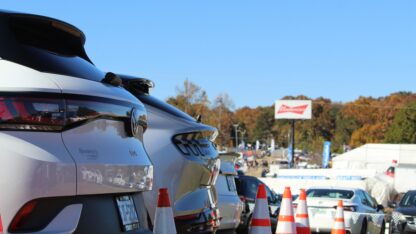Another giant electric vehicle plant is coming to Georgia.
Hyundai announced Friday it is planning a manufacturing facility for EVs and electric vehicle batteries in Bryan County, near Savannah. The company says it’s a $5.54 billion dollar investment, expected to create about 8,100 jobs, and pull in another billion dollars’ worth of investment from suppliers.
Hyundai executives gathered with state and local officials at the currently undeveloped site in Bryan County on a sweltering afternoon to make the deal official.
Jay Chang, president and CEO of Hyundai Motor Company, thanked Bryan County for the “warm welcome,” to chuckles from the crowd of people in suits, sweating in the tent.
“This new high tech EV plant represents the future of our business,” Chang said.
It’s the second big EV manufacturing announcement for Georgia in the span of six months. Late last year, Governor Brian Kemp trumpeted another electric vehicle plant as the largest business announcement in state history.
The Hyundai deal is bigger.
“I have the privilege, for the second time in the same fiscal year, of welcoming the largest economic development project in our state’s history,” Kemp said at the event in Bryan County.
Electric truck and van maker Rivian plans to build its $5 billion factory east of Atlanta, employing as many as 7,500 people.
Rivian is getting $1.5 billion in incentives for that project. Some people who live in the area have pushed back, with concerns about how the massive factory will change the character or affect the environment of the rural community.
The state has been working to attract the growing electric vehicle industry. Last summer, Kemp created the Georgia Electric Mobility and Innovation Alliance, an economic development initiative meant to bring more EV manufacturing and tech development to the state.
At the event, Kemp called Georgia “the unrivaled leader in the nation’s emerging electric mobility industry.”
Electric vehicles have also been a priority for President Biden as part of his effort to address climate change. The transportation sector is the largest source of greenhouse gas emissions in the country, according to the U.S. Environmental Protection Agency.
Biden announced a $5 billion plan to expand the EV charging network nationwide over the next five years. Earlier this month, the U.S. Department of Energy said it would put more than $3 billion into expanding domestic production of batteries.
Biden, who’s in South Korea, will meet with the CEO of Hyundai in Seoul before he leaves on Sunday, according to national security advisor Jake Sullivan. Sullivan told reporters on Air Force One that the president will “have the opportunity to say thank you for this significant investment that will occur in the United States.”
U.S. Sen. Jon Ossoff, D-Ga., traveled to Seoul last year for meetings to try to bring more manufacturing — especially clean energy manufacturing — to Georgia. While there, he met with Hyundai officials, including the chairman.
“This multibillion-dollar opportunity for Georgia will create thousands of jobs and grow Georgia’s reputation as a world leader in automotive and clean energy manufacturing,” Ossoff said in a news release.
Georgia is also home to manufacturing facilities for Korean electric vehicle battery maker SK and Hanwha’s Q Cells solar plant.
While Georgia has welcomed the growth of the clean energy industry, it has done little, politically, to address climate change, and it’s not particularly friendly towards electric vehicle drivers. A state tax credit for people buying new electric vehicles was allowed to sunset, and was replaced with an additional fee charged to EV owners in Georgia.
The Bryan County facility will be Hyundai’s second in Georgia, after the Kia plant in West Point. The new plant will be built at a 2,200-acre site off of 1-16 in Ellabell, Ga. The state and a coastal development authority bought the property a year ago, with hopes of attracting big industry.
Emily Jones contributed to this report.








